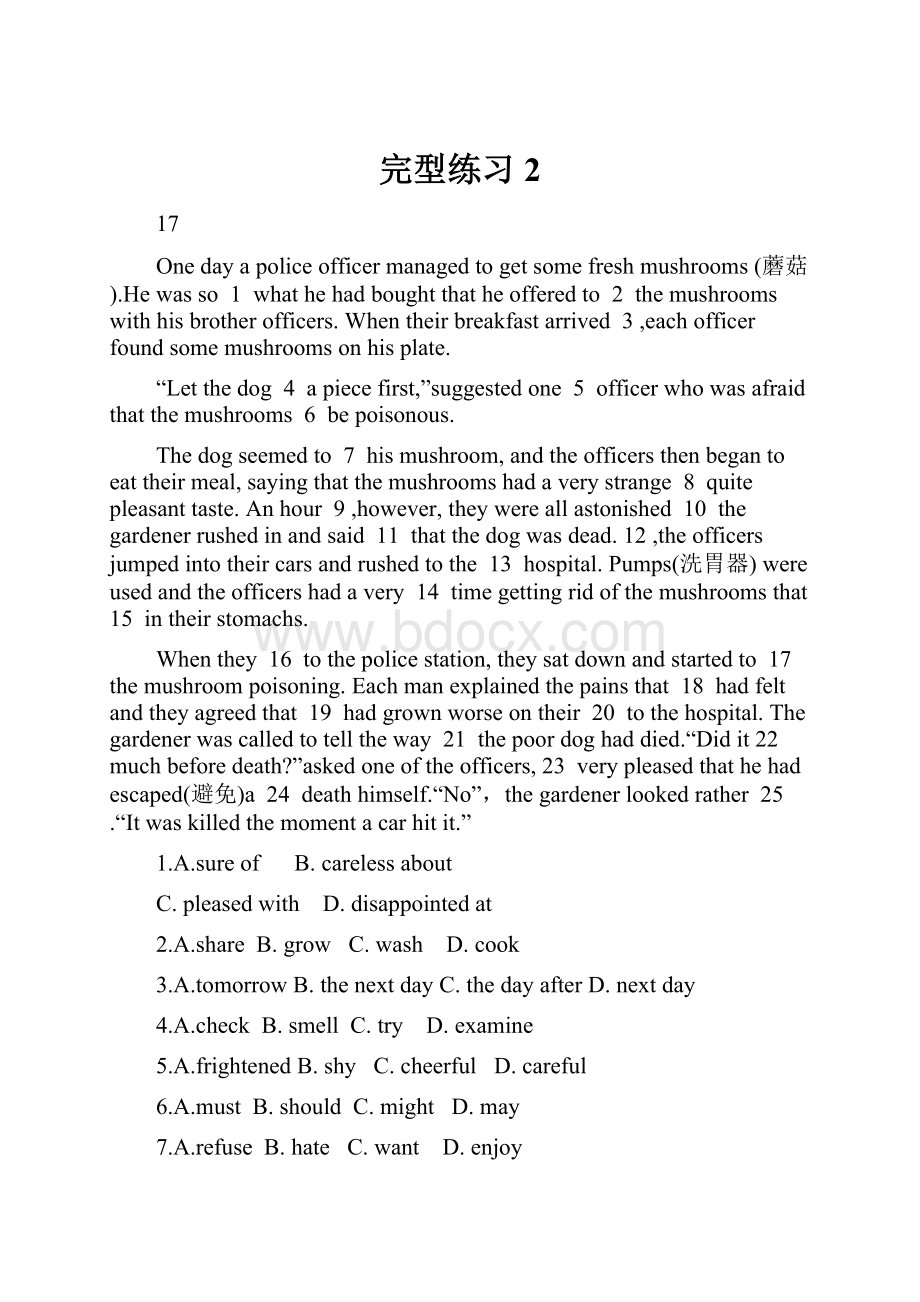完型练习2Word文档下载推荐.docx
《完型练习2Word文档下载推荐.docx》由会员分享,可在线阅读,更多相关《完型练习2Word文档下载推荐.docx(70页珍藏版)》请在冰豆网上搜索。

C.SuddenlyD.Slowly
13.A.animalB.biggestC.plantD.nearest
14.A.hardB.busyC.excitingD.unforgettable
15.A.stoppedB.droppedC.settledD.remained
16.A.hurriedB.droveC.wentD.returned
17.A.studyB.discussC.recordD.remember
18.A.theyB.anybodyC.heD.everybody
19.A.thisB.theseC.itD.they
20.A.roadB.streetC.wayD.direction
21.A.thatB.inthatC.whichD.inwhich
22.A.sufferB.eatC.harmD.spit
23.A.tofeelB.feelingC.feltD.havingfelt
24.A.strangeB.painfulC.peacefulD.natural
25.A.happyB.interestedC.surprisedD.excited
【解题指导】
1.C.因为“设法”买到新鲜蘑菇,当然是很高兴了。
2.A.主动提出建议与弟兄们共同分享这新鲜的蘑菇。
3.B.在nextday前加定冠词表示除了今天之外将来或过去任何一天的第二天。
4.C.根据下文的叙述可以判断。
这里try后面省略了eating(havingortaking).
5.D.提出先让狗尝蘑菇的警官很显然是细心的。
6.C.此空考查情态动词的形式及词义。
7.D.可从下文的内容中判定。
8.B.连词but这里表示转折。
9.A.意为“一个小时以后”。
10.D.根据句意选定。
11.C.seriously意为“严肃,一本正经”。
12.A.听到狗死的消息后,警官们立刻跳进车内。
13.D.警官们乘车飞速赶到最近的医院。
14.A.洗胃的滋味可想而知。
hardtime意为“难熬的时刻”。
15.D.残留在胃中的蘑菇。
16.D.为最佳答案。
17.B.回到警察局后,警官们开始坐下谈论蘑菇的毒性。
18.C.每人都在解释所经受的疼痛。
19.B.these指pains.
20.C.onone'
swayto…是常用词组。
21.D.inwhich引导的定语从句修饰先行词theway.
22.A.警官们一直以为狗是吃蘑菇中毒而死,所以问到狗临死之前是否遭到很多罪。
23.B.此处要求填入一个分词充当伴随状语。
24.B.免于痛苦一死感到很高兴。
25.C.园丁对警官的提问感到很惊奇,因为他知道狗不是中毒身亡。
18
Whenwebuyapostagestamptoputonaletter,wearepayingthepostofficefortakingtheletter.Thepostofficecannotdoitfor1.Postofficeshavetobebuilt.Postmenand2peoplewhoworkinpostofficeshaveto3.Thetruck,ship,trainoraeroplanewhichcarryourlettersallhavetobe4.Whenwe5thestamp,we'
repayingforour6oftheexpenses.Thisiscalled“postage”.
At7theamountofpostagetobepaiddependedonhow8theletterhadtotravel.Aletterthathadtogoalongway9morethanaletterwhich10togosofar.Butthiswasvery11toworkout.Peopleoftenusedtobuythe12stamps.Nowadayswepaythe13amountforaletter145milesaswe15foronegoing500miles.Buta16lettercostsmorethanalightone,17aparcel(包裹)costsmorethanaletter.Ifwewantourletterorparcel18byair,19isquicker,wehavetopay20.
Whenourletter21thepostoffice,a22isputontheenvelopeandstamp.Thisiscalled“postmark”.Thisshowsthe23,date,andplaceofposting.Italsomarksthe24sothatit25beusedagain.
1.A.nothingB.somethingC.anythingD.everything
2.A.theirB.allC.otherD.some
3.A.payB.bepaidforC.payforD.bepaid
4.A.paidforB.paidC.payingD.payingfor
5.A.seeB.buyC.collectD.stick
6.A.friendsB.shareC.stampsD.use
7.A.atimeB.thetimeC.timesD.onetime
8.A.longB.fastC.farD.soon
9.A.spentB.costC.paidD.takes
10.A.isexpectedB.wantedC.didn'
thaveD.ishoped
11.A.difficultB.troubleC.easyD.slowly
12.A.cheapB.expensiveC.wrongD.beautiful
13.A.differentB.sameC.smallerD.larger
14.A.whichgoesB.goesC.togoD.gone
15.A.areB.doC.canD.will
16.A.longB.shortC.smallD.heavy
17.A.asB.becauseC.andD.for
18.A.goesB.togoC.willgoD.going
19.A.asB.thatC.itD.which
20.A.thesameB.moreC.muchD.less
21.A.getsB.arrivesC.reachesD.comesfrom
22.A.markB.circleC.noteD.dot
23.A.monthB.weekC.yearD.time
24.A.letterB.envelopeC.stampD.address
25.A.mayB.cannotC.shouldD.needn'
t
1.A.本段说明为什么要付邮资(postage).
2.C.postmenandotherpeople构成全体邮局工作人员,即需要支付工资的对象。
A项则概念不清;
B项概念重叠;
D项又只能指“一部分人”,概念不全。
3.D.paysb.“付钱给……”,被动语态。
4.A.payforsth.“为……而付钱”,也是被动语态。
5.B.此处buy与主句中的payfor意义上相同。
6.B.意为“我们所应负担的那部分费用。
”
7.D.下文讲的是过去付邮费的方法;
atonetime意为“过去一段时间内”;
atatime意为“每次”。
8.C.由下文可知,邮费曾以路程的远近作为计算依据。
9.B.主题是“物”,又是过去,故选cost.
10.C.四项中唯有C是否定的意思。
11.A.B,D语法不通。
12.C.由于计算不准,人们不是多买就是少买了邮票。
13.B.thesame…as是一固定结构。
14.A.为定语从句,修饰letter.
15.B.do代指主句动词pay.
16.D.邮资改为根据重量来计算了。
17.C.上下并无因果关系,A,B,D都不合适。
18.B.want后应跟上不定式作宾语补足语。
19.D.非限制性定语从句,which指代航空邮寄这一做法。
20.B.航空邮件较快,因而邮资也较贵,more可与quicker照应。
21.C.reaches为及物动词。
22.A.mark即下句所说的postmark.
23.D.根据常识及下文的dateandplace,应在此处选time,表示具体的钟点。
24.C.盖上邮戳的另一目的是使邮票不能再次使用。
25.B.为最佳答案。
19
Afterfinishinghighschool,Judylookedforajobatastore.Judywantedtowork1anassistant.Themanagerofthestore2Judy.“Wedon'
thaveany3forassistantsnow.Butwehaveonejob.Wouldyouliketobeastoredetective?
Judywasverysurprised,“ButI'
m4fivefeettwoinchestall.
AndIonlyweigh105pounds.”Themanagerlaughed.“You'
rejust5forthejob,youdon'
tlooklikeadetective.Youlooklikea6.That'
swhatwewant.”Hewentontoexplain,“Ifyouseeacustomerstealsomething,wait7heisoutsidethestore.Thenstophim.We'
llcallthepolice.”
Judydecided8thejobasastoredetective.Eachdayshewalkedaroundthestore,9customers.Sherememberedthemanager'
swords:
“Mostshoplifters(扒手)are10.Manyshopliftersarerich.”
Themanager11right.OnedayJudysaw12wholookedlikeabusinessmanstanding13thejewelrycounter(柜台).TheassistantshowedthemangoldwatchesfromJapan.14,theassistantturnedtoanothercustomer.Rightthen,thebusinessmanputtwowatchesonhis15.Heworeacoatsonoonecouldfindhimout.Heputtwomorewatchesonhimself16theassistantturnedback.“I17thesewatches,”saidthebusinessman.
Themanwalkedas18aspossibleoutofthefrontdoorJudy19himoutsideandthenshouted,“20!
Isawyoustealfourwatches.”Themanbegantorun.Judyran21him.Shecriedout,“Stopthat22!
”Apolicemanatthecornerseizedthemanandlater,apolice23tookthethiefaway.
Themanagerofthestorewas24Judy.Hesaid,“Goodwork,Judy.Youare25.”
1.A.forB.asC.withD.like
2.A.receivedB.refusedC.rejectedD.accepted
3.A.partB.seatC.openersD.openings
4.A.atleastB.onlyC.alreadyD.nearly
5.A.rightB.notrightC.correctD.notbad
6.A.studentB.managerC.salesgirlD.customer
7.A.forB.untilC.whenD.while
8.A.togiveupB.tochangeC.toofferD.toaccept
9.A.watchingB.seeingC.hearingD.talkingto
10.A.poorB.inragsC.wearinghatsD.well-dressed
11.A.turnedoutB.turnedawayC.wentD.came
12.A.themanB.athiefC.someoneD.noone
13.A.atB.inC.behindD.on
14.A.SurelyB.BeforethatC.AfterthatD.Suddenly
15.A.fingersB.armC.footD.hand
16.A.beforeB.afterC.assoonasD.when
17.A.likeB.don'
tlikeC.willbuyD.haveworn
18.A.earlyB.freelyC.carefullyD.quickly
19.A.wasfollowedbyB.followed
C.sawD.sent
20.A.HelpB.OnC.NoD.Stop
21.A.toB.afterC.withD.andcaught
22.A.businessmanB.wayC.customerD.thief
23.A.carB.busC.stationD.bicycle
24.A.sorryforB.proudofC.afraidofD.strictwith
25.A.anexcellentdetectiveB.veryinteresting
C.agoodpolicewomanD.satisfied
1.B.意为“作为”。
2.A.经理“接待”Judy,下面是与之交谈的情况,因此,既未“拒绝”,也没“接受”。
3.D.openings在此意为“空缺”。
4.B.从下文看,是说“只”有那么高,那么重,即是个小个子。
5.A.适合于此工作。
6.D.工作性质决定需要混入customers中才好。
7.B.是最佳答案。
8.D.“接受”这一工作。
9.A.是最佳答案。
10.D.与下句所说rich口气一致。
衣着好。
11.A.turnout后接形容词,表示“结果真是……”之意。
12.C.看见“一个人”,并非特指。
13.A.站在柜台前,用at.
14.C.注意几个动作的先后衔接关系。
15.B.即为watches,又能由coat遮住,应该是往arm上戴了。
16.A.未被售货员察觉,偷表只能在其转身之前。
17.B.不买表的托辞。
18.D.溜走须“快”。
19.B.Judy紧随其后,也是manager所曾交待过的。
20.D.抓贼时的喊法。
21.B.“撵”。
22.D.此时身份已明,又是要人协助,直呼抓“贼”。
23.A.常识。
24.B.既已立功,为其骄傲。
25.A.赞扬其工作出色。
20
“Whereisthebus?
”Iaskedmyself.Iwasgoingtobelate1themanagerwasn'
tgoingtobe2.“ThankGod,hereitis!
”Thebus3roundthecornerandIgoton.TenminuteslaterIwaswalkingintothe4whereIwork.“Twenty-fivepastni